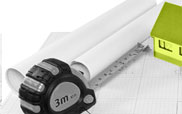Buying building materials


- Word of mouth is still the best way of finding good builders (but not always possible).
- If they use a trade organisation on notepaper (i.e. FMB or NHBC), make sure at the outset that they are current members.
- Try and talk to previous clients – you will learn a lot, even though they only put you in touch with the good ones.
Fixed price or day rate? Mostly the building trade works on a fixed price basis, but sometimes on smaller jobs it is difficult to make an accurate estimate and here you may choose to pay an hourly rate, or a day rate. Some trades (notably bricklayers and plasterers) like to work on a measured rate basis: here you agree to pay so much per thousand bricks laid or per m2 of plastering done and then calculate the total owed at the end by measuring how much was done. Whatever you choose, ensure that you agree beforehand what the terms are.
- Contracts: usually only used on fixed price work. With subcontractors (plumbers and electricians, kitchen fitters etc) the quotation may be the only contract form but on larger works — typically engaging a main contractor to build a house or an extension — it is a good idea to use a written contract. These will outline the terms of payment as responsibilities of both client and builder.
- Remember that a contract is no substitute for a detailed written specification of the works involved. This takes time (and costs money) to develop and often forms part of the design process.
- An hour spent planning the job before it starts saves four hours tidying it up at the end. It’s an old building adage but one worth bearing in mind.
![]()
